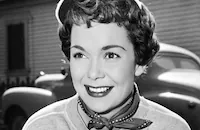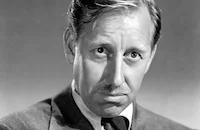So Big

Brief Synopsis
Cast & Crew
Robert Wise
Jane Wyman
Sterling Hayden
Nancy Olson
Steve Forrest
Elisabeth Fraser
Film Details
Technical Specs

Synopsis
In the late 1890s, Selina Peake, a student at a posh boarding school, is informed of the death of her wealthy father, who has left her penniless as a result of a botched business deal. Since the proud Selina refuses all offers of charity, August Hempel, the kindly father of Selina's best friend, Julie, obtains a teaching position for Selina in New Holland, a tiny Dutch farming community outside Chicago which has remained virtually unchanged for seventy-five years. In New Holland, Selina takes a room in the home of Klaas Pool, a crude farmer who scoffs at Selina's idealism and eye for beauty, and his overworked and miserable wife Maartje. Selina finds a kindred soul in Klaas and Maartje's son Roelf, a bright, but troubled adolescent who is unable to attend school because he must work on the farm. After discovering that Roelf has a talent for music, Selina gives him nightly piano lessons and encourages his artistic leanings, gradually leading him away from juvenile delinquency. At a charity auction, Selina catches the eye of the town's most eligible bachelor, Pervus DeJong, and later accepts his proposal of marriage. Roelf is devastated to learn that Selina, who represents to him the beauty of the world outside his hated hometown, is to marry a lowly truck farmer. However, Selina consoles him by explaining that she needs both "emeralds" and "wheat" in her life, emeralds being those people, like Roelf, who appreciate and create beauty, and wheat, those who work the land, providing the necessities of life. Selina settles into the laborious routine of a farmer's wife and gives birth to a son Dirk, who, as he grows, earns the nickname "So Big." Dirk soon displays signs of being an emerald in the rough, and although Pervus, who has never fully understood his wife, is mildly disapproving, Selina encourages her son's nascent artistic talent. Maartje dies and, shortly after, Klaas makes plans to wed the simpering Widow Paarlenberg. The grieving Roelf decides to leave New Holland forever and tearfully bids Selina goodbye. When Dirk is eight years old, Pervus dies from the strain of his hard work, and Selina, refusing offers of help from her neighbors, labors to keep the farm going on her own. Much to the shock of the denizens of conservative New Holland, Selina and Dirk travel unescorted to the Chicago Haymarket to sell their produce, but no one will buy from a woman. When all seems lost, Selina runs into her old friend Julie, now a divorced mother of two, and August, who offers to invest in Selina's proposal to grow exotic vegetables. Selina's "DeJong" asparagus is a huge success and, ten years later, she proudly sends Dirk off to college to study architecture. After college, Dirk begins work as a draughtsman in an architectural firm and maintains his involvement with his childhood sweetheart, Julie's spoiled daughter Paula. Paula, a manipulative social climber, pushes Dirk to earn more money and later convinces him to forgo his dream of becoming an architect in order to attain more immediate financial success. Dirk accepts a job in sales and promotion arranged for him by Paula, greatly disappointing Selina, who demonstrates her dismay by no longer referring to him as "So Big." Later, Dirk falls in love with talented artist Dallas O'Mara, who cares nothing for money and social status, and proposes marriage. Although she is fond of him, Dallas refuses, declaring that she could never marry a man whose hands are unscarred by real work. Roelf, now a renowned composer, has a triumphant return to Chicago, where he visits Dallas, an old friend from Paris. Accompanied by Dirk, Roelf takes Dallas to his reunion with Selina, and the two women, very much alike, become friends. After Roelf and Dallas leave, Dirk, fearing that he has lost both of the women he loves, expresses his dismay at how his life has turned out. However, Selina takes him in her arms and, calling him "So Big," reminds him that it is never too late to pursue his dream of creating beauty.

Director

Robert Wise
Cast

Jane Wyman

Sterling Hayden

Nancy Olson

Steve Forrest
Elisabeth Fraser

Martha Hyer
Walter Coy

Richard Beymer

Tommy Rettig

Roland Winters
Jacques Aubuchon
Ruth Swanson
Dorothy Christy
Oliver Blake
Lily Kemble Cooper
Noralee Norman
Jill Janssen
Kerry Donnelly
Kenneth Osmond
Lotte Stein
Jon Provost
Arthur Fox

Vera Miles
Evan Loew
Frances Osborne
Jean Garvin
Carol Grei
Grandon Rhodes
Anthony Jochim
Herb Vigran
Joe Duval
Frank Kreig
Bob Stephenson
Paul Brinegar
Billy Vincent
Joe Brooks
Mike Lally
Jack Henderson
Ralph Volkie
Steve Stephan
Al Lloyd
John Konorez
Dan Dowling
Dick Alexander
James Dime
George Selk
Spec O'donnell
John Maxwell
Bud Osborne
Ray Bennett
Jennings Miles
Frank Chase
Phil Tead
John Logan
James F. Stone

Marjorie Bennett
Bill O'brien
David Mcmahon
Chalky Williams
Charlicie Garrett
Joy Hallward
Bill Grimes
Thor Holmes
Michael Pierce
Clay Bennett
Cathy Creighton
Sue George
Gloria Moore
Jeanetta Lewis

Frank Ferguson
Tom Royal
Lillian Culver
Douglas Evans
Mary Alan Hokanson
Abdullah Abbas
Sara Taft
Dorothy Granger

Elizabeth Russell
Crew
Edward Allen
Milo Anderson
Gordon Bau
John Beckman
Henry Blanke
Hershal Brown
Paul Burnett
Murray Cutter
Harry Davis
Jack Delaney
Betty Lou Delmont
Ellsworth Fredricks
Bud Friend
Oliver S. Garretson
Rudy Harrington
Stuart Higgs
George James Hopkins
Anthony Jowitt
Thomas Reilly
Ed Rike
Irva Mae Ross
Russ Saunders
Fred Sheld
Howard Shoup
Max Steiner
George Sweeney
John Twist

Videos
Movie Clip



Trailer
Hosted Intro
Film Details
Technical Specs

Articles
So Big (1953)
In the final remake to date, Jane Wyman and Sterling Hayden starred under the direction of Robert Wise, later to win Oscars for West Side Story (1961) and The Sound of Music (1965). The screenplay for the 1953 version is by John Twist, with first-rate technical contributions by cinematographer Ellsworth Fredricks (shooting in black and white), composer Max Steiner and makeup artist Gordon Bau (who takes Wyman from youth to old age).
The sprawling story of So Big covers three decades. Wyman is cast as Selina Peake, one of those Ferber heroines who seemed ahead of their time in their awareness of feminism causes and willingness to challenge their roles in life and relationships with men. The story begins in the 1890s, when Selina is a boarding-school student cast adrift by the death of her father, whose lack of business skills leaves her impoverished. A friend of the father finds her a job as a teacher in New Holland, a somewhat backward Dutch farming community outside of Chicago. She rents a room from Klaas Pool (Roland Winters) and his longsuffering wife Maartje (Ruth Swanson), and befriends their young son Roelf, who shows promise as a student of music.
Selina soon marries stoic but well-meaning farmer Pervus DeJong (Hayden) and they have a son named Dirk, whose boyhood nickname is "So Big." In Selena's view of things, people are either "emeralds," those with refined sensibilities who create beauty in life; or "wheat," the ones who work to provide the necessities. She considers both Roelf and Dirk to be potential emeralds, while she and Pervus are wheat. When Dirk is eight, Pervus dies as a result of his hard life on the farm, leaving Selena to struggle along as best she can. Despite the local prejudice against a female farmer, she eventually triumphs, making a specialty of her exotic "DeJong" asparagus and earning enough to send her son to college.
As Selina ages, the grown-up Dirk (Steve Forrest) proves a disappointment, devoting himself to a social-climbing girlfriend (Martha Hyer) and immediate prosperity instead of following his dream to become an architect. Selina is so disappointed that she stops calling him "So Big." But she succeeds with Roelf (played as an adult by Walter Coy), turning him away from delinquency and toward a career as a successful composer. Dirk falls in love with free-thinking artist Dallas O'Mara (Nancy Olson), but she rejects him in favor of Roelf because she prefers a man who works hard with his hands yet sticks to his artistic principles. Dirk learns his lesson, determining to once again earn his aging mother's nickname of "So Big."
Throughout his career Wise was noted for spotting and developing young talent. For So Big he cast Jon Provost and Tommy Rettig as Dirk at ages two and eight, respectively. (Interestingly, both later played "Timmy," the young owner of the collie in the Lassie TV series.) Richard Beymer, cast as the teenage Roelf in So Big, would play the lead in Wise's West Side Story nine years later. Some critics, in retrospect, thought he was better in So Big.
Warner Bros., in typical fashion for the time, tried to add a provocative - even salacious - element to the movie's advertising, suggesting that Sterling Hayden's physical attributes had something to do with the title. Alongside an illustration of a strapping Hayden grasping Wyman's shoulders as she looks soulfully up at him is the legend, "He stood there So Big...she was ready to forget she'd ever been a lady!"
Wyman won the major share of critical praise, although most reviews of the film also mentioned Hayden in a favorable light. Bosley Crowther wrote in The New York Times that Wyman, "whose acting of drudges has become a virtual standard on the screen, is remarkably strong and effective in every forthright little bit she does." Helen Bower of The Detroit Free Press felt that Wyman "retains for Selina the undying spark of dreams that sustain her through the years of rugged farm toil." Crowther noted that the "solemn, stupid farmer husband" is played by Hayden "with skill." The reviewer for Variety wrote that "Hayden scores as the unlearned, rugged yet gentle farmer."
On September 21, 1954, Lux Radio Theater broadcast an adaptation of the 1953 film of So Big with Ida Lupino as Selina and Robert Stack doubling in supporting roles.
By Roger Fristoe

So Big (1953)
Robert Wise (1914-2005)
Born on September 10, 1914 in Winchester, Ind., Wise was a child of the Depression who quit college to earn a living in the movie industry. He began as an assistant cutter at RKO, where he worked his way up to the position of film editor and earned an Oscar® nomination for his bravura work with Orson Welles on Citizen Kane. He also edited The Magnificent Ambersons (1942) for Welles, along with several other RKO films.
Wise became a director by default when RKO and producer Val Lewton assigned him to The Curse of the Cat People (1944) after Gunther von Fritsch failed to meet the film's production schedule. Wise turned the film into a first-rate psychological thriller, and enjoyed equal success with another Lewton horror film, The Body Snatcher (1945).
Critical praise also was showered upon Wise's Born to Kill (1947), a crime melodrama; and Blood on the Moon (1948), an unusual psychological Western starring Robert Mitchum. Even more highly regarded was The Set-Up (1949), a no-punches-pulled boxing drama that won the Critics' Prize at the Cannes Film Festival. Wise moved on from RKO in the early 1950s, directing one of the movies' classic alien invasion films, The Day the Earth Stood Still, for 20th Century Fox.
At MGM he directed Executive Suite (1954), a compelling all-star boardroom drama; Somebody Up There Likes Me, a film bio of boxer Rocky Graziano that established Paul Newman as a major star; and The Haunting (1963), a chilling haunted-hause melodrama. His films for United Artists include Run Silent, Run Deep (1958), a submarine drama with Clark Gable and Burt Lancaster; I Want to Live! (1958), a harrowing account of a convicted murderess on Death Row, with Susan Hayward in her Oscar-winning performance; and the crime caper Odds Against Tomorrow (1959).
Wise served as president of the Academy of Motion Picture Arts and Sciences and the Directors Guild of America. He was awarded the Academy's Irving G. Thalberg Memorial Award in 1966, and the Directors Guild's highest honor, the D.W. Griffith Award, in 1988. He remained active as a director through the 1970s. His final film, Rooftops (1989) was a musical with an urban setting that recalled West Side Story.
The films in TCM's salute to Robert Wise are Citizen Kane (1941), The Magnificent Ambersons (1942), The Curse of the Cat People (1944), The Body Snatcher (1945), Born to Kill (1947), Blood on the Moon (1948), The Set-Up (1949), Executive Suite (1954), Somebody Up There Likes Me (1956), Run Silent, Run Deep (1958), B>West Side Story (1959), Odds Against Tomorrow (1959) and The Haunting (1963).
by Roger Fristoe
Robert Wise (1914-2005)
Quotes
Trivia
Notes
This was the third film based on Edna Ferber's Pulitzer Prize-winning novel. The first was a 1924 film starring Colleen Moore, and the second was a Warner Bros.' 1932 version directed by William Wellman and featuring Barbara Stanwyck as "Selina" (see AFI Catalog of Feature Films, 1921-30 and 1931-40). According to a modern source, Warner Bros.' misleading ad campaign for So Big, which suggested that the title referred to the strapping farmer played by Sterling Hayden ("He stood there So Big...she was ready to forget she'd ever been a lady"), touched off a storm of protest and the studio became the target of a mail campaign to pull the ads.
Although his appearance has not been confirmed, a March 1953 Hollywood Reporter news item adds Paul Grainger to the cast. According to a March 1953 Hollywood Reporter news item, Richard Beymer was treated for an appendectomy during production. A February 1953 Hollywood Reporter news item reported that portions of the film were shot on location at Santa Ana and Newport Beach, CA. Excerpts from the film were aired on Lux Video Theatre on November 5, 1953, during which Martha Hyer made a guest appearance. Lux Video Theatre aired an adaptation of the film on September 21, 1954, starring Ida Lupino as "Selina Peake DeJong" and Robert Stack as "Pervus DeJong" and "Dirk DeJong." According to October 1953 Hollywood Reporter news items, So Big was promoted at the Indiana State Teachers Convention and received an award of merit from the Southern California Motion Picture Council.

Miscellaneous Notes
Released in United States Fall October 21, 1953
Released in United States Fall October 21, 1953

















